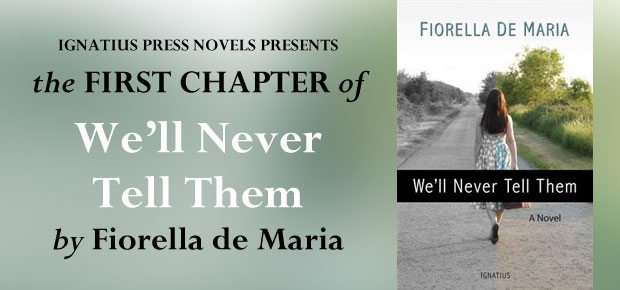Read the first chapters of the novel We’ll Never Tell Them by Fiorella de Maria. If you like what you’re reading, visit the novel’s page to learn more or order!
PROLOGUE
She had been to this place before. That was why, in her darkest hour, Kristjana had returned; she remembered the city from some far away dream of happier times and had come searching for it as though it were still to be found. She had not felt lost the last time she had stepped through Damascus Gate and walked among the hot, narrow, noisy streets of old Jerusalem, or if she had, she had not cared then. At eighteen years old, everything—even loneliness—had felt like an adventure. The space of a few short years could change everything, and Kristjana told herself that she might as well be an old woman, walking cautiously down the stone steps to a crypt where she felt more at home than among the jostle of the living.
She found the place she had sat on her last journey, partially hidden by a wall of smooth rock. It sheltered her from the gaze of anyone else who might wander round, and it was close to the tabernacle and the glow of the sanctuary lamp. When she had sat there as a gap year traveller, her head had still been full of the literary classics she was cramming for university, and she had thought in a pretentious moment that it would be a good idea to do what Sebastian Flyte had suggested in Brideshead: leave something precious in that place so that if life did not turn out as she had so hopefully planned it, she could return again and find the object. That way she could remember for a moment what it had felt like to be young and free and contented.
Kristjana was still young, though she had never been truly contented with life and was certainly not free. She was Scheherazade, a woman with a story to tell or to discover, whose only weapon to evade death was to be found in the weaving of stories. And somewhere in amongst all those mysterious threads of memory and make-believe, she thought she could discover a powerful enough reason to stay alive. Kristjana knew that if she stepped outside into the heat she had so recently escaped, she would find a stone pool where long ago a blind man was sent to wash the mud from his eyes and saw the world for the first time. That was why they all came, the tourists and the pilgrims in their orange baseball caps, visitors by the air-conditioned coach load. They were all explorers of a kind, hoping that in this most sacred and most divided of cities they might find the world and all its meaning in a blaze of overpowering light.
Kristjana was not like them, she was not an explorer by nature. If she was anything, she was a deserter hoping to hide among this forest of humanity—and where better for a refugee than a land of refugees? She was not even sure what she was running from, but in that worst year of her entire life she felt desperately frightened, not of the past, the place from which most people run, but of the future and what might be in store for her.
When I dipt into the future far as human eye could see;
Saw the Vision of the world, and all the wonder that would be.
It was never easy to know where to start any tale. That was why writers and storytellers relied on formulas to get the narrative moving: “Once upon a time”, “In the middle of the journey of my life”, “Tell me, Muse”. Kristjana’s story began with the words of Tennyson: “When I dipt into the future far as human eye could see”. That was how she had come to find herself hundreds and hundreds of miles away from home, sitting in ponderous silence. That was how it had started, far away in London, the city she called home, when she had looked into the future and seen nothing. Nothing, the sum of all human fears. She had convinced herself that she had no future, that there was nothing to look forward to, nothing to work for, and it was in that bleak, bewildered frame of mind that she had committed the craziest act of her entire life.
1
There is a little part of every person that dreams of doing this, but most adults are too rational and too anchored by life to contemplate actually going through with it. All Kristjana could say in her defence once she had carried out her plan—if it truly had been a plan—was that she had not been entirely in possession of her mental faculties at the time or she would never have done such a thing. When she had woken up that morning, she had had no intention of doing anything other than going through the same routine followed by millions of others at the start of the day—washing, dressing, making the bed—but instead of donning her black trouser suit and man-frightener high heels, she had found herself dressing in jeans and a T-shirt. Before she knew it, she had walked past her briefcase sitting squat and reliable near the door and began to pack her travel-worn rucksack with changes of clothing and a few bits and pieces she might need if she were away from home for any length of time. She transferred her purse, phone and passport to a small red handbag that was light and easy to carry, then stepped out of her room without a glance over her shoulder. After that, it all seemed so easy. She just walked away.
Earth has not anything to show more fair.
Nothing could touch her anymore. Not the crowds of commuters, not the buses and taxis and the jungle of office blocks. She had told Benedict once that for people like her, to be at home could never be a comforting feeling, but she was not at home any longer. She was back in the hinterland of her childhood, watching the antics of a tribe she did not understand, and she was content to stay there in that in-between, “not quite” world with no identifying marks or familiar places of its own, except for the holes and empty spaces where those landmarks should have been.
 Kristjana came to a halt on the crest of a footbridge in the middle of Saint James’ Park. She leaned against the railing and watched the river traffic passing below, her mobile phone poised in one hand as she puzzled over what message to send. In the end, she simply wrote: “Have gone 4 a short holiday. Don’t worry about me. Need to clear head. Bye.” Then she wondered to whom she should send it and realised there was no one. Her landlady would notice eventually that she had not seen her lodger for a few days; her boss would try to contact her when she did not turn up for work; Benedict was thousands of miles away in a lab in Massachusetts. Friends, well they could never be trusted to notice anything when it came to it. So she deleted the text message and wrote instead: “I resign.”
Kristjana came to a halt on the crest of a footbridge in the middle of Saint James’ Park. She leaned against the railing and watched the river traffic passing below, her mobile phone poised in one hand as she puzzled over what message to send. In the end, she simply wrote: “Have gone 4 a short holiday. Don’t worry about me. Need to clear head. Bye.” Then she wondered to whom she should send it and realised there was no one. Her landlady would notice eventually that she had not seen her lodger for a few days; her boss would try to contact her when she did not turn up for work; Benedict was thousands of miles away in a lab in Massachusetts. Friends, well they could never be trusted to notice anything when it came to it. So she deleted the text message and wrote instead: “I resign.”
Kristjana sent the message to her line manager’s mobile number; then—to the astonishment of several passersby—she dropped her phone into the river with barely a ripple breaking the surface of the water, and walked away in the direction of Saint James’ Park tube station and the westbound District Line. By the time she had changed trains and was speeding down the Piccadilly Line to Heathrow, she was certain of her destination. She was going to the farthest point from London she had ever ventured, a country to which the citizens of the world are drawn but where no one could be truly at home. It was indeed the perfect destination for Kristjana Falzon.
If you like what you’re reading, visit the novel’s page to learn more or order!







Leave a Reply